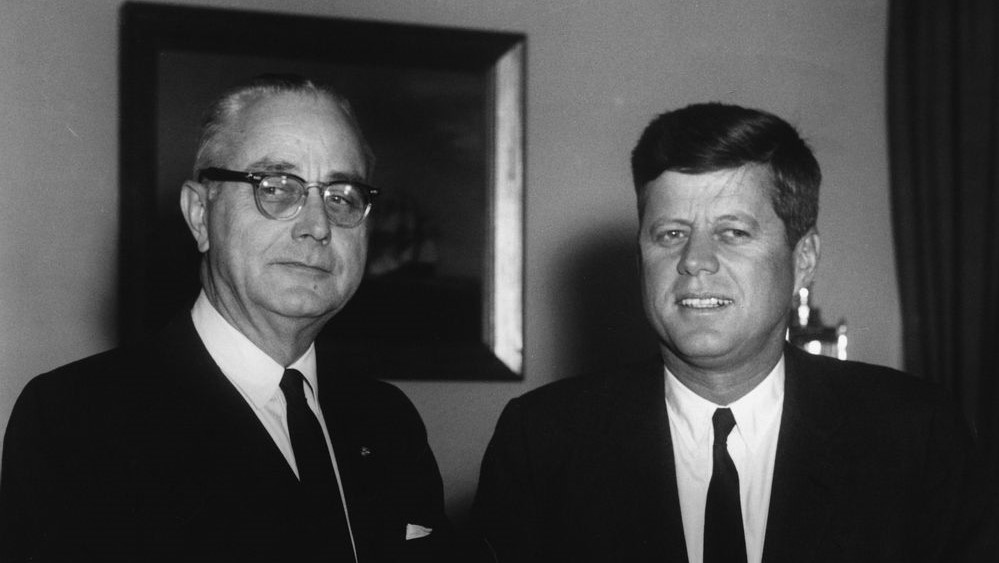The Senate's inquiry into a Kennedy Administration defense contract is considered one of the longest and most extensive congressional investigations ever undertaken.
-
February/March 2021
Volume66Issue2
The Kennedy administration took office under a small political cloud. Allegations of fraud and vote-stealing filled the air in the days following John F. Kennedy's narrow victory in November, 1960, but as president-elect and as president, Kennedy avoided any extended comment on this sensitive subject.
On November 24, 1962, the Department of Defense announced that it was awarding the $6,500,000,000 contract for 1,700 TFX fighter bombers, “the most coveted prize the Pentagon ever dangled before bidders," to the General Dynamics Corporation. The TFX (Tactical Fighter Experimental) became the F-111, a supersonic all-weather attack aircraft capable of carrying nuclear weapons and for low-level, high-speed flight. It was the first production aircraft with variable-sweep wings.
The competition for the contract had been intense for a number of reasons: the utilization of the novel variable-sweep wing would give the winner extremely helpful experience in employing this new technology; it appeared likely that the TFX would be the last major military airplane procurement for the rest of the decade; the huge dimensions of the Pentagon's purchase would keep the successful firm and its subcontractors busy for years.
Secretary of Defense Robert S. McNamara had begun accepting applications for the contract in the fall of 1961, and by the spring of 1962 the contest had narrowed down to two companies: General Dynamics and Boeing. Soon after it was disclosed that General Dynamics had won, Senator Henry Jackson, a Democrat of Washington, the site of Boeing's home offices, asked the Permanent Subcommittee on Investigations to examine circumstances leading to the decision. A preliminary inquiry was started in early December.
Thus commenced “one of the longest and most extensive congressional investigations ever undertaken.” The subcommittee conducted two comprehensive sets of hearings, the first in 1963 and the second in 1970, and it did not submit its report until eight years after the TFX contract had been signed. The 1963 hearings were held on forty-six days between February 26 and November 20 and filled 2,740 pages of printed record. Almost all of the sessions were behind closed doors, as requested by the Pentagon, because specific details about the TFX were highly classified; censored transcripts of the proceedings, however, were made public the same day.

Jackson sought the investigation because he had found out that the Pentagon's Source Selection Board, composed of top generals and admirals, had been unanimous in its finding that the Boeing proposal was technically superior to, and less expensive than, the General Dynamics version of the TFX. What Jackson and the subcommittee wanted to know was why McNamara and the civilian secretaries of the air force and the navy had overruled the board and decided “to buy the second best airplane at the higher price.”
The political implications of Jackson's request for an inquiry were obvious. General Dynamics would build the TFX at its Fort Worth plant, and the Vice President, the former secretary of the navy, and the new secretary of the navy were all Texans. Together, Texas and New York where General Dynamics' primary subcontractor, Grumman, had its facilities-had far more electoral votes (sixty-nine) than Washington (nine) and Kansas (eight), where Boeing would have produced the TFX at its Wichita factory. Both Texas and New York had gone for Kennedy in 1960: neither Washington nor Kansas had. Furthermore, General Dynamics was in serious economic trouble: its contract for the B-58 was winding up, and it had just suffered severe losses on its commercial jets. Republicans and Democrats wondered if the contract had been awarded as a result of political and regional pressures, possibly in conflict with national security and economy interests.
How much the President knew about the TFX contract before it was signed was a question the subcommittee could not answer. That Kennedy approved the contract is certain; whether he indicated any preferences in his talks with McNamara did not come out in the evidentiary record compiled by the subcommittee. “What part the White House meetings played in the decision, the panel's report concluded, “is not known.”
Nor could the subcommittee determine if the choice of General Dynamics had been politically inspired. McNamara categorically denied that socio-economic factors or Vice President Johnson's Texas background had any bearing on his decision, but the panel was something less than impressed by the "cursory deliberations” of the Secretary which led to his reversal of the Source Selection Board's expert opinion.

If the subcommittee failed to confirm or allay Jackson's suspicions on the political issue, its probe of the TFX did raise some doubts about the propriety of two Defense Department officials' behavior. Evidence gathered by the panel's staff revealed that Deputy Secretary of Defense Roswell L. Gilpatric had performed a number of legal services for General Dynamics and had attended many of the corporation's board meetings while he was in private practice during the late 1950s. The investigators also disclosed that soon after the TFX contract had been awarded, General Dynamics chose Gilpatric's old law firm, Cravath, Swaine & Moore, to be the company's counsel, and elected a senior partner of the firm to its board of directors.
More embarrassing to the administration were the subcommittee’s revelations about Secretary of the Navy Fred Korth. At the panels hearings in July, the staff brought out the fact that Korth had retained $160,000 of stock in a Fort Worth bank which did business with General Dynamics. Three months before becoming navy secretary, Korth, as president of the bank, had approved a $400,000 loan to the aerospace company. An examination of the log of visitors and telephone calls to Korth's Pentagon office also disclosed that the Secretary had contacts sixteen times with representatives of General Dynamics, as compared to only two with Boeing's, during the contract competition in 1962.
Additional evidence uncovered by the subcommittee forced the President to request Korth's resignation the next month. Korth had testified that he had severed his relationship with the Fort Worth bank but a check of the institution's records showed that while at the Pentagon Korth had received letters of praise from the bank's officers for bringing them new accounts. Some of the letters written by Korth to promote the bank's business were on navy stationery and included an offer to invite some of the bank's “extra good customers” for a ride on the navy's official yacht, the Sequoia.
Although the Justice Department found no illegal acts by Korth, the Attorney General believed that the President had no choice but to demand Korth's resignation. In mid-October Korth asked to be relieved, citing the need to attend to his “pressing business affairs." The President's acceptance letter, while omitting the usual “regrets," thanked Korth for his contributions to the improvement of the navy.
It appears that the administration attempted, unsuccessfully as it turned out, to conceal the real reasons for Korth's departure. Wishing to avoid any inference that questionable activities had touched the awarding of the TFX contract, the Pentagon spread the story that Korth had left because of a dispute with the Defense Secretary over the latter's decision not to proceed with development of a nuclear-powered aircraft carrier. Korth’s letter-writing activities came out a few days later, however, and at his October 31 press conference the President was asked if the Secretary’s resignation had been requested. “I think the letters which Mr. Korth and I exchanged,” replied Kennedy, “explain the situation as I would like to see it explained.”
Writing in his column the next day, James Reston commented, “Korth wasn't crooked; he was morally insensitive and stupid, but the President insists Korth wasn't fired, which raises the question: Why not?"
Adapted from a longer essay which originally appeared in Presidential Misconduct: From George Washington to Today, edited by James M. Banner, Jr. Published by The New Press. Reprinted here with permission.

